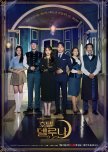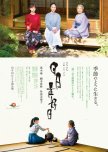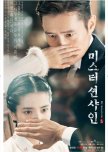
Every episode of Hotel del Luna is amusing, captivating, intriguing, stirring, and thrilling due to the perfect balancing of humour, fantasy, myth-making, drama, romance, and horror further enhanced by the gorgeous costumery of the female lead, visually-dazzling production, heartstrings-tugging soundtrack music, cameo roles, and socially-relevant sub-plots that tackled: molka epidemic; prevailing patriarchal assumptions; and toxic netizen culture.
Two of the most popular young actors today, Lee Ji-eun or better known as IU and Yeo Jin-goo exude palpable chemistry in their memorable lead performances as Jang Man-wol and Gu Chan-seong, respectively. The accursed millenium-old Man-wol is the alluring, chic, ethereal, luxurious, and petulant chatelaine of the mystical and marvellous Hotel of the Moon while the dashing, dutiful, empathetic, and courageous Harvard graduate Gu Chan-seung serves as the hotel's 99th or current human manager.
Veteran thespian Seo Yi-sook leads the trio of superb supporting cast as the mysterious deity with several identical manifestations. She is joined by Shin Jung-geun who plays the 500 y/o untimely-killed Joseon top scholar-turned-hotel bartender and by Bae Hae-sun, the 200 y/o grudgeful murdered daughter-in-law of a privileged clan who is the hotel's meticulously efficient room service supervisor. Also starring are promising actors Lee Do-hyun and Lee Tae-sun; idols P.O and Mina; and Cho Hyun-cheul and Park Yoo-na. Jung Dong-hwan as ex-Manager Noh and Kang Ho-seok as Grim Reaper are also endearing in the portrayal of their special characters.
Hotel del Luna, although a fantastical drama, is actually a foray into the reality of life. It teaches among other things: that like flowers from the moon tree, life is beautiful yet fleeting - and so, we must make the most out of it; that humans are endowed with the ability to make choices and are consequently tasked to bear responsibility for the choices they made; that life is not always easy or fair - as such, we must learn to play the hand we're dealt with much courage and grace; that if the past is a source of suffering or ill-feelings, we must learn to let go and make peace with it and with ourselves if there's nothing anymore that can be done about it; that our way of thinking and feeling can have a powerful outcome or influence; that revenge is sweet for it provides an outlet for pent-up aggression and wounded feelings, but, at the same time, it is also burdensome and masochistically painful for it recoils and does not diminish with time, thus inflicting endless pain on the person who exacted vengeance; that forgiveness has a rending and liberating power; that love has a transmogrifying power which can contour our character - either for the worse or for the better; and as Gu Chan-seung has perfectly shown us - that true love is self-abnegating or it makes you forget yourself and seek the welfare of your beloved.
Unfailingly riveting until the end, Hotel del Luna will for sure hold a place in the hearts of many of us. A big kudos to the writers, director, actors, and production crew for making this drama an enjoyable and worthwhile watch.
Was this review helpful to you?

This review may contain spoilers
Basically, Every Day A Good Day is about finding the fire which ignites the spark within consequently giving life meaning. Noriko, the main female character, always fondly mentions La Strada, one of Federico Fellini's most celebrated films and it's not difficult to figure out why. Just as the character/s in the aforesaid award-winning Italian film, she likewise sees herself as a drifter searching for a real purpose in life. Attending a Japanese tea ceremony on a singular occasion as a guest is perhaps one of the most wonderful things I've ever experienced. I hope to experience it once more, and I hope you'll get to experience it as well. In the initial scenes, we witness Mrs. Takeda, the tea sensei, admonishing Noriko (and Michiko) for analysing every step in the Way of Tea. This is because analysis runs contrary to the precepts of Zen Buddhism which holds primacy over the path of action in conjunction with meditation in performing a task or learning a skill because only in this way can harmony with nature and innate tranquilitea be achieved.
''In the practice of tea, a sanctuary is created where one can take solace in the tranquility of spirit.''
I highly recommend a book called Chado (The Japanese Way of Tea) most esp. if you're an enthusiast of tea and/or if you're on the path towards serenity.
Was this review helpful to you?

This review may contain spoilers
Working together for the third time, Writer Kim Eun-sook and Director Lee Eung-bok forged yet again another drama into a landmark. Masterfully melded with realism and romanticism, Mr. Sunshine offers an indelible image of the waning age of the Korean Empire. By far the most ambitious K-drama ever mounted, it's a legendary saga of romance and war told in an unforgettably cinematic style.Every episode is like a mini-movie offering hardened yet vibrant characters, panoramic views, and emotionally-gripping action, climaxes, and plot twists. Further enhanced by heart-rousing OSTs, it's one of those black pearl-rare dramas that keep the viewer entranced right from the episode's very beginning and wired up to its last scene only to re-watch the whole episode again to fully savour and comprehend its magnificent scale and dramatic mystique.
Aforesaid praises aside, this drama is worth watching for the intelligent and memorable characterisations by a constellation of the brightest acting talents ever assembled. Protagonist or foe, adult or child, in main, supporting, or cameo roles - we've grown to either hate them or adore. It stars Lee Byung-hun as the righteous, enigmatic, and romantic USMC Capt. Eugene Choi; Kim Tae-ri as the sharp-shootin' spunky noblelady Go Ae-sin; Yoo Yeon-seok as the hapless romantic gang boss Gu Dong-mae; Kim Min-jung as the enchanting hotelier/fencing femme fatale Kudo Hina; Byun Yo-han as the noble-hearted dashing nobleman Kim Hui-seong; Choi Moo-sung as the hardy yet hearty gunner Jang Seung-gu; Kim Kap-soo as the famed potter/RA's revered leader Hwang Eung-san; Kim Eui-sung as the uber-wicked Lee Wan-ik; Lee Ho-jae as the venerable Lord Go; and many more.
In watching Mr. Sunshine, we've witnessed how noble, self-abnegating love works; how character is built; how unlikely friendships are formed; how loyalty is won; how cultural stereotypy of femininity is 'lunged' at and/or 'sniped'; how grace and equanimity can be maintained under surmounting pressure; and above all, how to make a difference esp. in a period of constant change and great tumult.
Two and a half hand-spans and back, we circumspectly yet excitedly nagivated the intricate terrains of Eugene's and Ae-sin's hearts as we concurrently entered into a world of history. At the end of our long journey, some of us have been left intrigued and wondering thus warranting a peer-back with critical eyes through the fog of time to re-examine important world events at the dawn of the 20th century. It is without a doubt that Mr. Sunshine not only left us overwhelmingly entertained but also edified.
Kudos to Kim Eun-sook for her astute and dynamic story-telling; to Lee Eung-bok for his meticulous and gorgeous camera work; to all the actors for their topnotch performances; to the crew for their diligent and painstaking efforts; and last but certainly not least, to fellow fans of Mr. Sunshine for helping make the drama an immensely enjoyable watch down to the last minute through your percipient comments, clever reviews, and delightful artworks.
Until next time.
Was this review helpful to you?



